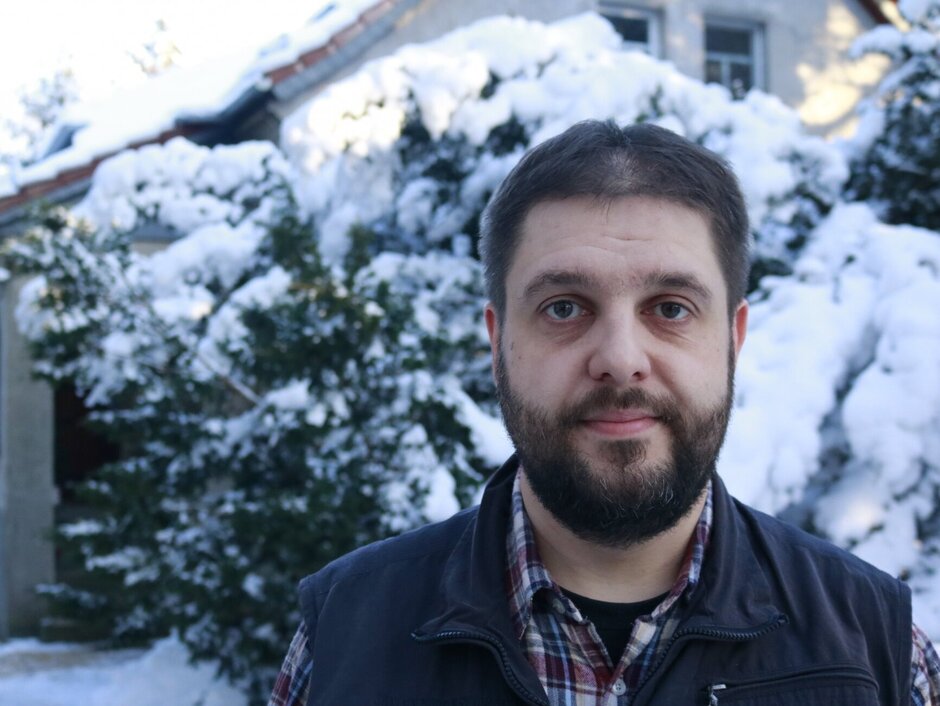
© LEAD-Partner City of Kamenz
The family estate of the Leuthold family is located on the street B97. Huge rhododendron bushes grow behind a beautiful wrought-iron fence, behind which flows the river Pulsnitz - a dream. The family home is framed by the evergreen splendor. It is inhabited by the parents and since November 1st 2016 by son Carsten - a man of clear words. “I am the way I look”, he says with a smile and you believe him. With his deep, sonorous voice and the lumberjack shirt, he is a man who can help. “I'm still in the middle of the renovation”, he says. He wants to renovate his parents' house step by step with a lot of personal contribution. He wants to keep the charm of the villa built in 1932. He knows that it takes time and nerves.
Farewell to home
But right from the start: until 2001, the 39-year-old completed an apprenticeship as a brewer and maltster at the Radeberg export beer brewery. After the apprenticeship, he sent exactly one application and was accepted at Löwenbräu in Munich. His move was like an escape. He had a week and a half to find accommodation and to arrive in his new home. He found his first place to stay in a guesthouse outside of Munich. Despite the fact that the hosts of the “Haberlwirt” treated him like his own son, his heart was attached to his home in Saxony. He visited the parents at home as often as possible.
From 2003 to 2005 he completed the basic course in chemical and environmental technology at the HTW in Dresden. Then it went back to Munich until 2006. He then did his master brewer's degree at the experimental and educational institute for brewery in Berlin. The next stop was the Urbach mineral springs, which belong to the Coca-Cola group. He tirelessly honed his professional profile. Became a sensor specialist and also trained young people in this profession. In addition, he began to train as an occupational safety specialist. He did not yet know that this training would lead him back home.
The chance to return arises
In spring 2016, father Leuthold cut out the advertisement for the returnee project “Wachstumsregion Dresden” from the newspaper. Carsten Leuthold started a research and got in touch with the project management. Project manager Manuel Saring referred him to the employment agency. “I was thrilled by Mr. Saring and Ms. Robitzsch. Both have far exceeded my expectations of friendliness and commitment. No trace of obstinacy with the authorities”, he says with serious appreciation. He was informed about all the formalities that a withdrawal home entails. But the most important thing now was to find a new job. And here everything went very quickly again. At that time, Sachsenmilch Leppersdorf GmbH advertised the position of a specialist for occupational safety. In July 2016, he was invited to the first interview, which was followed by the second selection round on August 21. “The site's human resources manager, Christine Schmidt, told me that on August 24, I would receive approval or refusal. I should read my emails that day. At 9.20 p.m. - I remember that - the answer came - I had the job. “You can still see the joy in this moment today. “I called my parents. My mother cried.” On November 1, he started his new job and has not regretted his decision for a minute.
Closeness to home and closeness to the family are driving forces
In summary, he says: “I never really wanted to leave. It was always the work that I went for.” And added: “My goal was always to come back sometime.” When asked what he loved about his homeland, he made a plea for his Saxon: “I love the cosiness and rest here. It is not as densely populated, less loud and much more contemplative. But what is much more important is the directness and openness of the people. Here you say what you think. I just remained a village child, so I can't get out of my skin.”
The close relationship with his family also played an important role for him. “My parents always supported me with all my strength. It goes without saying that I am there for them now that they are getting older.” The closeness to the home and the closeness to the family are the driving forces for returning home. That was also the case with Carsten Leuthold.
The existence of a job, the feeling of being needed at the place of his childhood and youth, but also the unbureaucratic support that Carsten Leuthold received from the employees of the project “Wachstumsregion Dresden!” and their networks let to this result and are a further evidence of the importance of efforts to help returnees to get back home.
Interview and text: Kristina Kroemke
